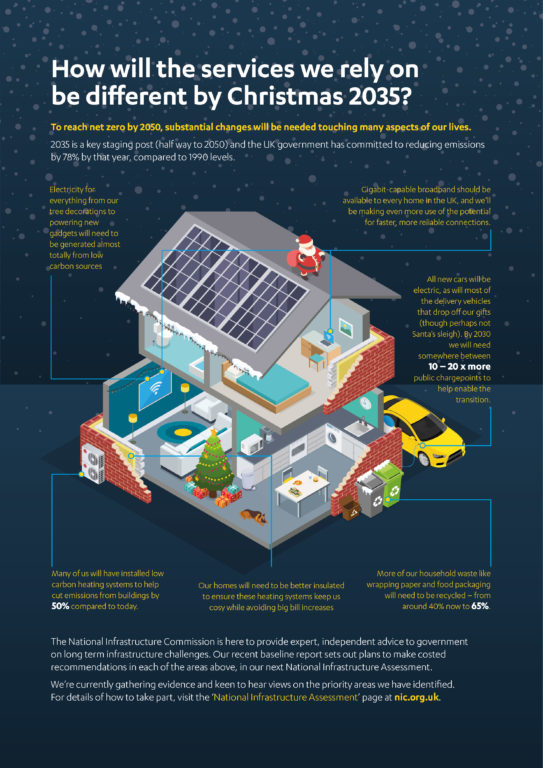Achieving net zero greenhouse gas emissions by 2050 will mean that Christmas is likely to look very different within the next 15 years.
By 2035 – half way between today and the legally binding 2050 deadline for the UK to hit net zero – the UK will need to have cut emissions by 78% compared to 1990 levels.
To get there, and meet the Sixth Carbon Budget, there will need to be a range of changes to the way key utilities and other household services are delivered.
While Santa might not need an electric sleigh, the infrastructure that sits behind other treasured Christmas traditions such as cooking the turkey and turning on the Christmas tree lights will need to be decarbonised. The National Infrastructure Commission is providing independent expert advice to government on how policy and funding will help secure that transition, alongside investment by the private sector.
A new graphic created by the Commission illustrates some of the ways our homes will look different by 2035, including that:
- All new cars will be electric, as will most of the delivery vehicles that drop off our gifts; this will require far more public chargepoints
- Many of us will have installed low carbon heating systems to help cut emissions from buildings by 50%, alongside better home insulation to ensure those systems work effectively
- More of our household waste like wrapping paper and food packaging will need to be recycled – from 40% now to 65%
(A full-sized pdf of this graphic can be downloaded via this link and is freely available for re-publishing and sharing)
Those changes will be in addition to the inevitable technological advances over the next 15 years, and behaviour changes following the Covid pandemic which may continue to have an impact on how we use infrastructure.
The Commission is exploring all of these areas as part of its second National Infrastructure Assessment, due in 2023. The recent Baseline Report set out nine priority areas that will form the heart of the next Assessment, and where the Commission will make costed recommendations to government to help ensure the UK’s infrastructure is ready not just for Christmases to come, but for all year round.





